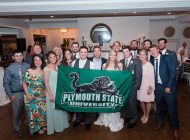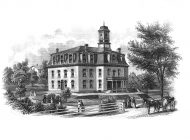Remembering Dr. Roi M. White
and the Plymouth Players
Plymouth State University’s Music, Theater, and Dance Department, and future Arts & Technology Cluster, is the “creative heart” of campus. Theatre’s development and resulting success can be attributed in part to the late Dr. Roi M. White, the man who, quite literally, built PSU’s performing arts program from the ground up. From being a kid who was “born in a trunk” to two stock theater actors and receiving no traditional schooling outside of the theater circuit until high school, to building a highly respected theater program and receiving an honorary doctorate, White epitomized the notion that hard work and passion pay off. As Dr. Charles R. Duke ’62 noted in an article at the time of White’s retirement, “If the theater is magical, Dr. Roi White … is a magician who made it come alive.”
Between 1951 and 1978, White established one of the finest collegiate theater programs of its kind and became widely recognized for his work. Much of this recognition was thanks to the Plymouth Players student performance group he established. Early in the group’s existence, as Professor Jim Hogan (PSC 1953-1986) mentions in his book Plymouth—Where My Viewpoints Crossed, “The Players, along with the Boston University School of Theater, were singled out of all the academic theaters in New England as doing ‘pioneering work’ in the training of school, theater personnel.”
The Players started without a significant budget allowance, so they built sets in the basement of Rounds Hall and performed in a small lecture hall. Dr. Charles R. Duke noted at the start, “All that [White] had were enthusiastic students, but those, in his opinion, were quite enough. He had to borrow tools from the maintenance department to build stage settings, and chairs and a table from the local hotel for props.” Despite these initial challenges, the Plymouth Players grew into a professional-level performing group that produced shows across the region, drawing crowds by the hundreds.
“In a college with no theatre majors, and no formal drama department, Plymouth emerged as an almost mythical creator of theatrical magic in the Northern hinterlands,” recalls Terry Lorden ’66, a former Player who later worked with White to establish the American Stage Festival in Milford, New Hampshire. “A kind of cult, a good cult, naturally formed around Roi’s creations. Audiences from some distance, but also theatre-devoted, mature performers, artists, photographers, set builders, wardrobe collectors and re-creators, and historians became working members.”
In the years following its creation, the Plymouth Players emerged as the face of Plymouth for the New England region. This centrality in the public’s eye was an unplanned, yet magnificent development for the Plymouth Teachers College (PTC) and Plymouth State College (PSC) communities. Performing an exceptional four major shows per year, the group wowed audiences with works of Shakespeare, Tennessee Williams, Arthur Miller, Eugene O’Neill and many of theater’s other notable playwrights.
White not only instructed the Plymouth Players through their productions, but created the set designs, lighting configurations, and various aspects of the period costuming required for each play. With such immense passion and work ethic, there was no better man to take on that challenge. In White’s own words, this enthusiasm stemmed from genuine love for his job: “I have liked my work so much. I have been pleasantly surprised that I have been paid to do it,” wrote White. This sense of commitment extended beyond his productions to include his many students, as well. White didn’t want to simply give his students an education; he strove to provide them with experiences. Through their work in Plymouth State Theatre, and grueling apprenticeships on the summer theater circuit, many of his students found a passion.
In his instruction, White challenged his protégés to push their limits. He strongly believed in the hidden potential of his performers, particularly those that were more reserved. He found that some of his best students came from people who were quiet or shy, and said that his greatest joy was “to see people blossom, to see them successfully express themselves, and to build something inside that shows through in their lives.”
Working with the students of PTC and PSC was one of White’s most significant passions. Many of his students from the Plymouth Players went on to become educators of the arts, and professionals on the theater circuit as actors, directors, stage managers, and set builders. His dedication proved to be infectious, as his students often worked as hard as he did, giving their best efforts to the craft, developing and refining their theater skills along the way.
Commenting on White’s dedication to his students, Larry Presby ’58 remembers that “as the Plymouth Players’ Director, White never failed to make rehearsals a teaching time, as well as requiring perfection in performance.” White’s remarkable accomplishments in building an exceptional theater program, his commitment to his students, and his passion for the theater led to his award of a Doctor of Humane Letters Degree by PSC and the University System of New Hampshire in 1972. The honorary degree is awarded to those who are outstanding educators and leaders in their field. There was no more qualified recipient for this honor than Dr. Roi White. As Duke said, “the honor was richly deserved because it was for much more than producing plays. It was recognition for a man who had devoted his entire life to bringing the theater to life for people.”
White retired from PSC in 1978, but continued his work in the theater until his death in 1984. Today, his legacy lives on in the creative culture of PSU. His legendary Plymouth Players endure, still performing on campus. During his tenure, White inspired a close-knit community of innovation, passion, and creativity that remains central to the core values of Plymouth State University to this day.
■ Kendal Lariviere ’17
Barbara Demmett Webb, Class of ’65
Remembers Dr. Roi White
Barbara Demmett Webb, Class of ’65, acted under the direction of Dr. Roi White at Plymouth Teachers College (PTC) and slowly found a path into theatre, first via community theatre and most recently into local professional theatre productions. Since moving to Plymouth, she’s performed with the Papermill Theatre at Jean’s Playhouse in Lincoln as well as the Winnipesaukee Playhouse in Meredith.
Webb was comfortable with the stage from an early age; singing, dancing, and performing before women’s clubs, grange halls and veteran’s hospitals. She then dabbled in theatre a bit in junior high and helped back stage for her senior play in high school. When Webb saw a posting in Rounds Hall during her freshman year at PTC she decided to audition. She was cast by Dr. Roi White as Muriel McComber in Eugene O’Neill’s Ah, Wilderness! and in many subsequent productions, including The Torchbearers and The Merchant of Venice while studying to become a teacher.
“I learned valuable acting skills from Dr. Roi White and enjoyed my time as a Plymouth Player very much,” says Webb. “I have fond memories of those times.”
The stage door reopened for Webb at the age of 45 when she performed in a community theatre production of Crimes of the Heart, and it has not closed since. She learned of numerous community theatres in New Hampshire and kept an eye out for auditions. Her passion is evident as she performs in one play after another, despite the rigor of learning lines and traveling to rehearsals. “Community theatre requires a lot of work and a lot of travel time, but it also provides a lot of pleasure,” shares Webb.
The prestigious New Hampshire Theatre Awards began in 2002, and seldom has there been a year when Webb didn’t receive a nomination. She was selected as Best Actress in Community Theatre both for August: Osage County and for The Dining Room and as Best Supporting Actress for Blithe Spirit. She is very proud to have been one of the top five finalists for Best Supporting Actress in Professional Theatre in 2015. She and her husband, Gordon who is the men’s lacrosse coach at PSU, moved to Plymouth in 2007. She immediately became involved with the Educational Theatre Collaborative (ETC) and has performed in four of their recent productions. She says performing with ETC helped her meet people in Plymouth and the surrounding area. In her first ETC show in 2008 she was surprised to meet up with a local thespian, with whom she had shared the stage at PTC 45 years before.
Her list of things she had planned to do while in retirement remains predominantly untouched. “This theatre hobby has changed all that,” says Webb.
■ Besty Cheney ’89 ’99G
Tags: alumni arts and technology cluster Barbara Webb Class of 1965 dance Hanaway Theatre Jim Hogan Music plymouth players plymouth state college Roi M. White Theatre

















